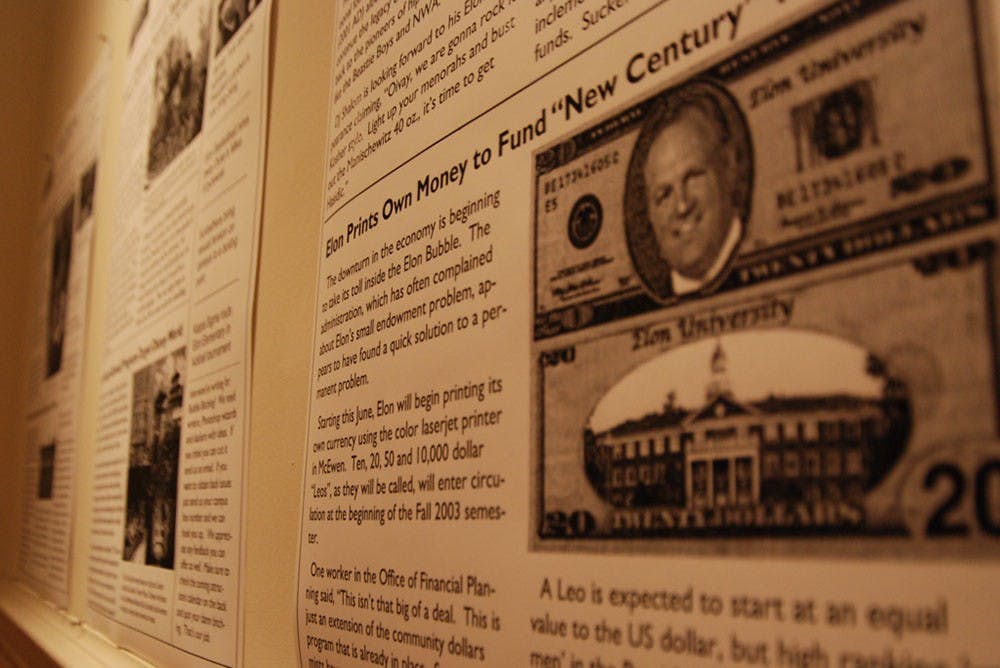Missed the retrospective on Bubble Bitching?
Sorry. The exhibition is not coming back.
The Sorry, Elon University's one-night-only curatorial club produced an exhibition and kick-off party titled "(Almost) 10 Years after Bubble Bitching". BB, as it was known, was a fake news broadsheet similar to The Onion. It skewered everything from ARAMARK to Elon students in the name of humorous subversion.
The Sorry hosts one-night-only events because, "they emphasize the urgency of new mediums and embrace social life as a space for reflection, conversation, and analysis," according to the retrospective's description.
Assistant professor of art Juan Obando is the adviser for The Sorry. He said that the group serves to dispel the myth that gallery exhibitions are elitist.
"Art students see art as something that may not be attainable," he said. "A lot of art is very institutionalized."
But although Bubble Bitching wasn't a work on canvas or sculpture, to members of The Sorry, it warrants an artistic exhibition.
"I believe that art is all around us," Obando said. "It's just about being able to connect with it intellectually and contextually. That's what I hope students get out of this."
The driving idea behind The Sorry, he said, is to make exhibitions that aren't pretentious and are accessable to the average Elon student. But sorry, one night only.
The pages of Bubble Bitching were enlarged and hung on the walls in the Arts and Letters learning community in Trollinger House.
"A big trend in contemporary art is rediscovering the undiscovered," Obando said.
No current Elon student was on campus during the time of Bubble Bitching, so it was appropriate to bring it back up, he said.
Visitors milled around snacking on bite-sized desserts, Double Bubble gum and listening to hit songs from 2003.
Sophomore Essie Lazarus attended the event and walked around the gallery space, reading the stories. She said she liked the idea of Bubble Bitching but was unsure of how it would come across today.
"I think it would be great," she said, "But I don't know how successful it would be because they make fun of the majority of Elon students on campus. I don't mind being made fun of, but I don't know how others would feel."
Obando said that the idea to spotlight Bubble Bitching came along when he was in a meeting with other faculty. Associate professor of computer sciences Megan Squire recalled Elon formerly had an alternative "news" publication and said she had saved as many as she could.
"It was so funny," Squire said. "And I was so proud of the students."
Squire kept the majority of the issues, but didn't know that Belk Library's Archives and Special Collections had taken interest and also preserved the papers. From there, Obando pitched the idea to the club and it took off.
According to materials provided at the exhibition, Bubble Bitching was a phenomenon, each issue eagerly awaited by students, faculty and staff alike. Its short run has so far not been repeated.
"Some of the stuff (covered in Bubble Bitching) we're still complaining about," Squire said. "And some of it is like, 'Hmm?'"
Obando agreed.
"Times really have changed," he said. "But everyone still thinks this stuff. It is all the same."
Movements such as Not On Our Campus, Occupy Elon and others are within their rights to publish something like Bubble Bitching, or something more serious. But there is no right time for something like Bubble Bitching to come back, Obando and Squire said separately.
"The time is always urgent for people to speak up," Squire said. "Funny news never goes out of style."
She said, though, that many Elon students either do not have strong enough opinions, or are afraid of potential consequences of speaking out.
"The issue I see is that students like to get permission," she said. "They don't want to be bad."
Bubble Bitching stood out because the editors, who remain anonymous, never asked to publish. They also never considered themselves a challenge to other student media, just a different outlet.
"(The editors) just said 'What? We're going to do it,'" Squire said. "Some part of speaking up, something like Occupy is a little more earnest, a little more serious, but maybe being a little absurd is part of the same tradition"


